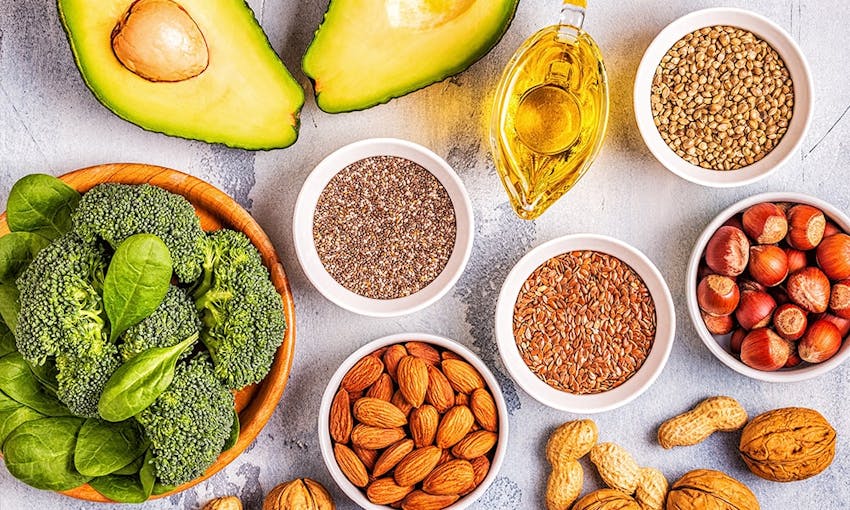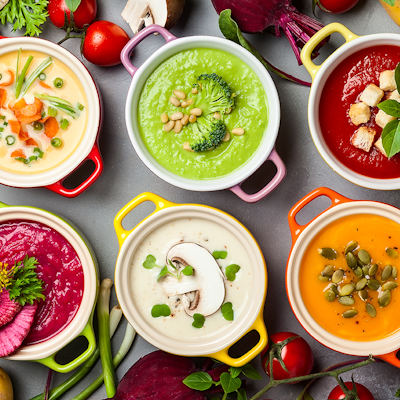Mood Boosting Foods
The excitement of Christmas is over and warm summer evenings seem a million miles away, so it’s understandable if you’re feeling a bit down in the dumps.
But don’t worry – there are things you can do to feel better. It’s no secret that our diet plays a vital role in our health and wellbeing – our moods largely depend on signals from the brain, which is greatly influenced by diet. So here’s a list of all the essential vitamins and minerals your body needs (and the foods that contain them) to ensure 2024 gets off to a super start.
Prebiotics and probiotics
The gut is sometimes called “the second brain”, since research proves that our gut microbiome is essential in impacting our mood and overall health and wellbeing. Prebiotics and probiotics are both essential for gut health.
Prebiotics – essential for feeding probiotics, these are an insoluble fibre that cannot be digested, and help in supporting digestive function by encouraging beneficial bacteria to multiply in the gut.
Where to find them: Asparagus, bananas, apples, onions, garlic, leeks, Jerusalem artichoke, chicory root, jicama root, konjac root, cocoa powder, flaxseed, seaweed, radishes, coconut, sweet potato, hemp seeds, cabbage, berries.
Probiotics – these are live microorganisms that keep gut flora balanced, and provide you with health benefits such as supporting the immune and digestive systems. They also ensure optimal brain performance.
Where to find them: Kefir, kombucha, miso, kimchi, sauerkraut, probiotic yoghurt, apple cider vinegar, fermented vegetables, natto and tempeh.
Essential Vitamins
Calcium is essential in maintaining strong bones, healthy blood and reduces the risk of type 2 diabetes. For women, low levels of calcium can play a role in premenstrual syndrome-related depression.
Where to find it: Collard greens, yoghurt, kale, sesame seeds, chia seeds, cheese, sardines, almonds, edamame, tofu, figs, milk.
Vitamin D helps increase serotonin levels within the body, and is vital for the absorption of calcium. Though usually produced when your body is exposed to sunlight, you can also get vitamin D from foods.
Where to find it: Cod liver oil, salmon, swordfish, chanterelle mushrooms, milk, cheese, fortified foods, salmon, egg yolks.
Top Tip: It’s a lot harder for vegetarians and vegans to get Vitamin D, so if you are one, make sure you eat lots of mushrooms, fortified milks, and tofu and supplements.
Omega 3s contribute to 18% of the brains weight, though our bodies do not naturally produce Omega 3s, so we need to get it from other sources. Studies show a correlation between high levels of Omega 3 fatty acids and a decreased risk of depression.
Where to find it: Chia seeds, salmon, Chinese broccoli, herring, spinach, walnuts, canola oil, flaxseeds.
Iron transports oxygen around the body, supports energy levels and helps keep our muscles strong – low iron levels lead to fatigue, depression, and in serious cases, anaemia.
Where to find it: Spinach, broccoli, brown rice, fortified cereals and porridge, soybeans, lentils, beef, turkey, dried fruit.
Zinc is in almost every cell of the human body, and helps to protect the gut from damage. Low levels of zinc can result in weak immune, loss of appetite, hair loss and depression.
Where to find it: Roasted pumpkin seeds, cashews, crab, pork loin, Swiss cheese, hemp seeds, eggs, milk, cheese, whole grains.
Top Tip: Vegetarians need more zinc due to the body’s lower absorption rate of plant-based zinc.
Chromium aids the body in metabolising foods and works directly with the brain mood regulators – playing an important role in increasing the brain’s serotonin, norepinephrine and melatonin levels which help to regulate emotion and mood.
Where to find it: Broccoli, potatoes, turkey breast, apples, bananas, green beans, Brewers yeast.
Magnesium is essential for so many functions of the human body – particularly the development of serotonin. It has a great ability to regulate emotions.
Where to find it: Almonds, spinach, cashews, peanuts, edamame, dark chocolate, avocados.
B Vitamins
Vitamin B9 (Folic Acid) helps create new cells as well as supporting serotonin regulation. If your body lacks folate this can cause fatigue and low levels of serotonin.
Where to find it: Spinach, asparagus, brussel sprouts, avocado
Vitamin B6 influences emotions, regulates brain function and helps send messages from our brains to the rest of our bodies. Being deficient in B6 can cause anaemia, a weakened immune system.
Where to find it: Chickpeas, yellowfin tuna, salmon, chicken breast, fortified breakfast cereals.
Vitamin B12 creates red blood cells and nerves – consuming recommended amounts of B12 allows the body to synthesize nutrients crucial in normal neurological function.
Where to find it: Trout, salmon, swiss cheese, mozzarella, tuna.



